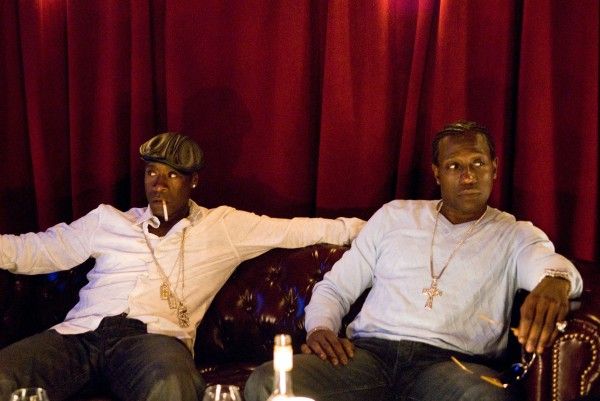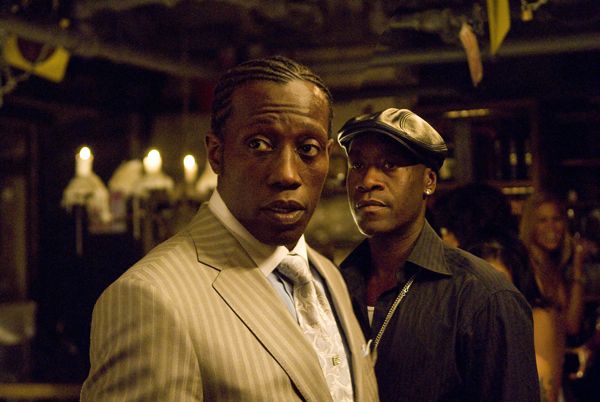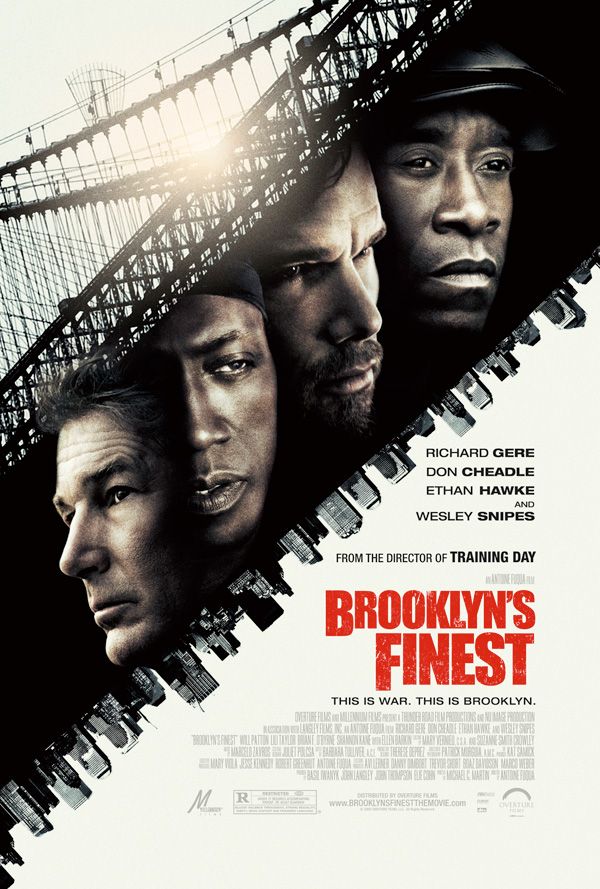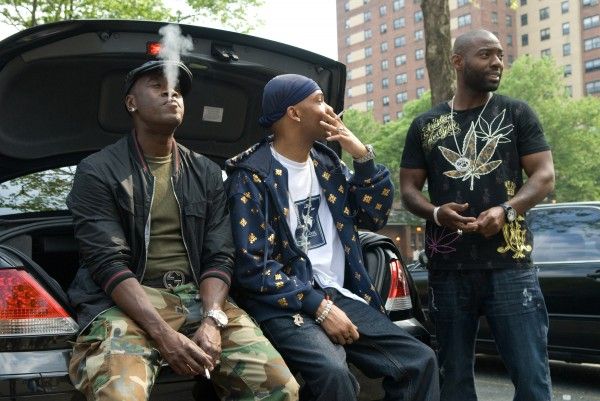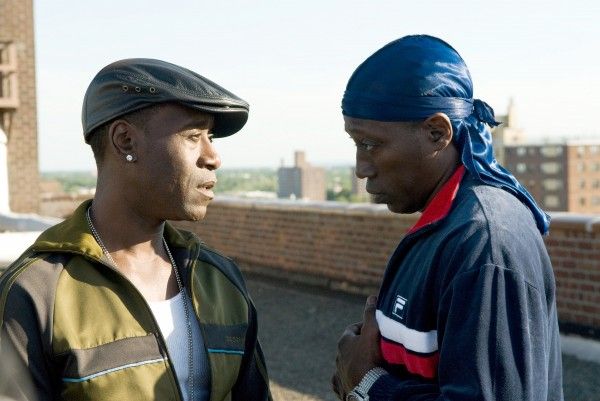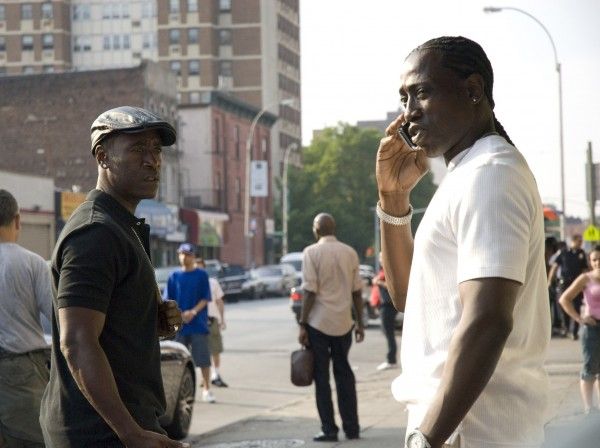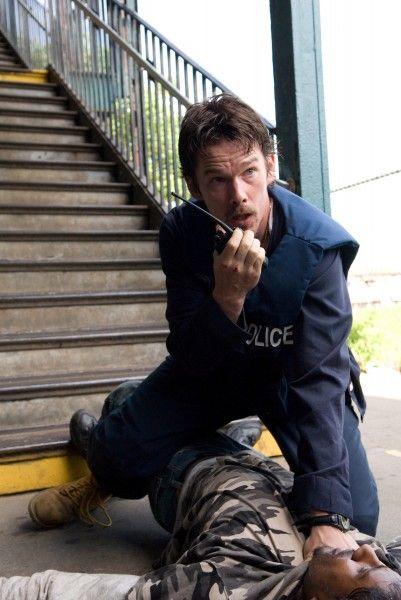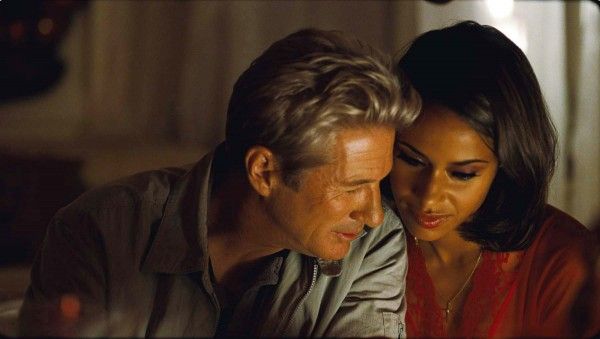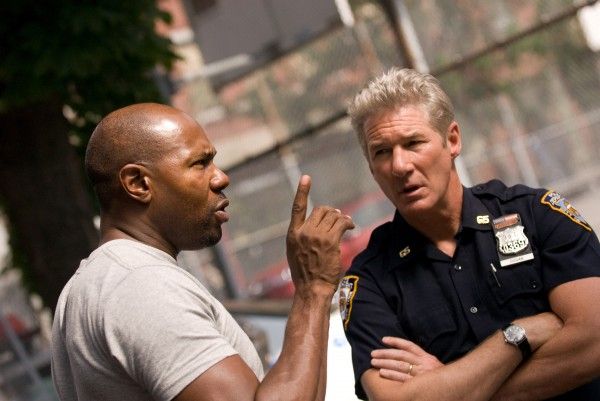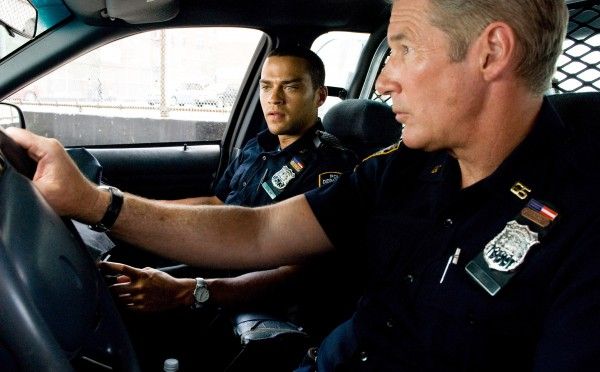Popular speculation views Antoine Fuqua's picture, Brooklyn's Finest, to be a re-hashed version of Martin Scorcese's 2006 Oscar triumph, The Departed. The assumption is that both movies use the same formula (powerful casts, acclaimed directors, and crooked cops v. career criminals) to tell the same story. In reality, this comparison makes as much sense as Val Kilmer as Batman. It quickly becomes apparent that Fuqua has seen those other cops and robbers films, and has literally flipped the script.
The actors themselves best explain why Fuqua's soon-to-be-acclaimed picture successfully reinvents the cops and robbers formula. In recent interviews with Wesley Snipes, Don Cheadle, and Richard Gere, the stars of the film explain what attracted each of them to the project, and what makes this film so unique.
Hit the jump for more:
Brooklyn's Finest seems like the quintessential police drama. Even the title sounds circa 1955. You've seen these movie actors before, whether sweeping a hooker off her feet or jumping into plane landing gear. You've seen these movie characters before - the undercover cop, the heartless cop, the crooked cop, and the career criminal who is a legend on the streets. Those big stars on Hollywood Blvd and cliché on-screen characters are always the focus; always the punch-line. What you haven't seen is something deeper, until now. With Brooklyn's Finest, Fuqua breaks the classic cops and robbers mold : "Hawke is crooked, Gere's depressed, and Cheadle's undercover. Great. You know that, and we know you know that. You've seen that a million times before. Don't look now, we're about to make a sharp left turn."
In the opening scene, Sal (Ethan Hawke) and Carlo (Vincent D'Onofrio [didn't know he's in it? don't worry, you won't remember]) recall a parole violation. There is no "right" and "wrong". There's only "righter" and "wronger". This concept of moral fortitude in every decision makes Brooklyn's Finest a new breed of police film. It's not your century-old battle between good v. evil. Instead, the film's true message is more revealing than Eva Mendes in Training Day (also directed by Fuqua, bam!). The real conflict is between each character's actions, and the motivation behind such actions. Brooklyn's Finest is about making the wrong decisions for the right reasons.
Up first is Wesley Snipes and Don Cheadle. Further below is Richard Gere.
--
The interview started with Wesley Snipes alone, then Don Cheadle arrived.
Q: Long hair in Brooklyn's Finest, huh?
Wesley Snipes: Yea, a little bit of a different angle.
Q: While we have you alone for a few moments, did you know that they are turning a Brooklyn subway station into a tribute to Michael Jackson for the Bad video?
WS: I heard about that, through the grapevine, yea. That's cool. That would be cool.
Q: What are your memories of shooting that video in the subway station?
WS: That was..yea..the amazing thing was that I was only supposed to be on the film, or project, for about 3 days, and it turned out to be 3 and a half weeks, almost a month, really. And the thing I took from it most was watching Michael Jackson perform, at performance level, in his rehearsals. I said, "Wow, that's the consummate artist right there." And that's the pinnacle of where I'd like to go, and the kind of skill I would like to have as an artist. That I can come in at my rehearsals and treat them like performances. I took that from him, and that's what I've been trying to do consistently in my work.
Q: What do you think about Jay-Z commenting that "We Are The World" should have been left alone because an icon did it, and it should not have been recreated?
WS: Well, I understand the motivation behind it, but I don't really have a critical comment about it. I am more critical about how Michael was treated, more than anything else. I think that he was an angel sent to us, and I think that we might have to reflect on how well we took care of him. People like to say, "Oh, people around him were bad and they didn't do right by him." But I think this is collective too. Because I don't know the last time, and I can't remember any other artist that attracted that much energy and projected that much power. That was that creative, and affected so many people, and was such a diplomat for America, and a champion for American culture, and African-American people worldwide. People wanted to move to America because of Michael Jackson. Industry changed, the music industry changed, because of Michael Jackson. That's a gift to us, and, you know, I am concerned that the Good Lord may not send another one because we did not take good care of him (Michael Jackson).
Don Cheadle then walked in
Q: What attracted each of you to this movie?
Don Cheadle: Well, there was a wheel barrel full of money that was brought to my house (laughs), and it turned out not to be counterfeit, so I was in. But, no, I wanted the opportunity to work on something like this with Antoine, who I think has a real firm grasp on this genre. Once he started to tell me the cast members, and I admire Wes's work for a long time, so I thought it would be a great opportunity to work with Wes and the others, in a real drama. Like I said, this genre, the movie's really exciting.
WS: Antoine and I have been trying to work together for about 10 years. And, our schedules just didn't sync. This time, I was available, he had a project, and then he told me about this guy (Don Cheadle), and I was like, "man." I've been wanting to work with Don for a very very long time. And then he said Ethan Hawke and Richard Gere were in the movie, and all my reservations about playing a drug dealer went out the window. I was back on the block! (laughs)
Q: Wesley, what kind of reservations did you have?
WS: I don't like perpetuating the stereotype of black males being drug dealers, and criminals. I think that it's interesting to watch how Nino Brown transcended and became this urban folk hero of sorts, and guys come up to me and say, "Yo, Snipes, I'm the real Nino. That's me." As if that's a badge of honor, and I should be patting them on the back. I'm not with that. And I did not want to recreate that kind of role.
Q: What's different about this character (Caz) and why he doesn't fit into that.
WS: He learned. Look, incarceration can change you. He learned a lot. And he had a time to reflect on the error of his ways, and the futility of that path, and how much death he was distributing to his own community. How he was a contributor to the demise of his own community, and the destruction of the community. So he gets out, and he realizes, "look, if I don't change my life, and if I don't go walk a different path, it's a wrap. It's a wrap. That, to me, is a redeeming quality in the character, and a redeeming character for me, the actor having played Nino.
Q: This is also a movie about friendship and loyalty. Don, you were very upset about what happened to your friend in this film, even as a cop.
DC: Yea. Well it's someone who has been under for a very long time, and those lines become very blurry, because all those experiences day to day and moment to moment aren't with your fellow police officers. They are with people that you are facing real violence, and real death with, and you've got each others backs. There's a realness on that level, and when I talked to real undercover cops, there is always that moment where they have to go, "woah woah, wait a minute, I'm a cop." Because these people you are growing these bonds with...that fucks with your mind, to have to lie everyday, and every moment, and how do you feel about yourself, and who are you at the end of the day? This is a character who wasn't going home at the end of the day, but was still in the streets, so it makes sense to me that he was this conflicted about what he was going to do and how he was going to serve both these masters, so to speak.
Q: How challenging of a character is that to play, when you are shooting out of sequence? How do you keep the lines from blurring?
DC: It's called the job. I have never worked on a movie that has shot in sequence, ever, never once. I mean, there will be big portions of it that do, but there is inveritably a moment in between all that stuff that you shoot in February, and now you're in July, and "where was I then?" You need to go back, and look at the continuity and look at the tape. It's the job. You really have to take good notes. And also, having a director who's got that all in their head, so they can really make sure you're in the right place.
Q: Thinking back to your own personal experiences with cops, do you have a different appreciation or attitude towards them after having worked on this film?
DC: It didn't change for me how I thought about cops.
WS: I have so many in my family. I don't have an innate animosity towards police officers, and I understand the predicament that they're in. Sometimes they go into it just to pay the bills, or just because they don't have other choices, or sometimes they go into it just to get the gun (DC: mmm-hmmm). You know, I don't have that kind of, it didn't change my perspective. It did educate me to the psychological challenges they face, and how that part of their lives is often overlooked. I didn't know that more police officers die as a result of suicide (DC: suicide), than often in the line (DC: line of duty). That's amazing to me. But that's the product of living in a war zone.
DC: Yea, we are seeing the same kind of numbers coming back from war in Afghanistan. Very very high.
Q: Don, fill us in on some of those intense scenes with Ellen Barkin.
DC: We had, that was interesting. There was a take actually in the film, where I got her neck in both of my hands. It didn't make into the movie, but I really wished that played (laughs), me actually choking her. It was very interesting, like I said, we got one side to this character where he is being pushed by people he does not like, and who he is really at the crossroads with, and another side of people who he is supposed to turn over are his boys, and people who have his back moment to moment, so it made it much more difficult. But Ellen is a pro, so we had fun doing it.
Q: How was it filming in Brooklyn? Were you afraid? We've heard those neighborhoods are rough.
DC: Great.
WS: Well some of the restaurants over there, I still go to over there by myself (laughs).
DC: I think that Antoine may have had a professional fear obviously because if you are trying to control your film, and you're in a place where A. there's nobody who's ever filmed there, they don't have film crews there, and you know, you can't just tell everyone, "shut up, and quiet on the set." That's something you have to ask for. It's not like there's any demand that can be made, "quiet on the what?" (laughs). That's it, "that's my house, fool." So, ya know, it's, you really have to work with the community, and in a way, I think it was great. Because A. they were seen "quote on quote". No one has ever shot anything there. No one has ever stopped to look at them and their lives. I think that's something that we wanted to talk about and focus on. And Antoine pulled from the community. He pulled a lot of people from the community to help work on the film, so I think there was a real nice kind of reciprocity in that way, and I personally never felt scared. It was great for me to hang back, and watch Wesley, and Mike (Williams), and Hassan (Johnson) walk through the streets and get the thralls of people follow them, and I just walked by, and they didn't pay any attention to me (laughs); I just walked by them. Cause, ya know, Wesley's a huge star down there, but no bigger than Mike Williams and Hassan, from The Wire. Those dudes were the stars.
Q: Where did you film in Brooklyn?
WS: Brownsville.
Q: Where are any restaurants around there?
DC: We went anywhere and everywhere. It was cool.
WS: Wang's Chinese food! (laughs)
DC: It was cool. Seriously, I never felt scared. I know it's dangerous, but danger, to me, is about having the attitude. I think if we had gone in there like, "You guys are all here to serve us, stay in your place, and we'll tell you what to do." No, we asked the people in the neighborhood, like "Yo, could you talk to your people over there, and let them know we're doing something. And later, yea, we'll do pictures and autographs and all that. But right now we gotta get this scene." You know, empower them to actually...empower them? No, not empower them, they had the power. It's like recognizing that, yea you guys are running shit. "Look, can you handle that, can you handle that over there?"
Q: This movie seemed so real.
DC: It's a powderkeg down there. A powderkeg.
WS: I think that's a testament to Faqua; that's the director and the writers. They have that authenticity. Real authenticity. And I think we, as film fans, we like that. I mean that's a throw back to the 70's (DC: the 70's, yea), the 60's, and even the 50's. That kind of gritty, realistic film-making.
Q: Has Al Sharpten seen the movie yet? How do think he would react?
DC: Al, please buy a block of tickets (laughs) for you and all your constituents.
Q: Don, before we finish, any new and unique projects on the horizon?
DC: A film about Miles Davis. I hope so, touch wood. It's been a long time coming. Working on a script right now, and hopefully it will find a home.
WS: Change is gonna come brother.
DC: Yea, it's tough getting movies made right now, but we're trying for that.
Q: Why is it hard to get movies made right now?
DC: Because President Bush broke the world (laughs). Money done (laughs). Nobody has dough, and you know, movies are corporate. Studios are corporations now. Movies are a small part of that business, so it's a very corporate model now, and it's not just movies. Anybody in here have a lot of money? (everyone nods no).
WS: Umm no. It's tough, it's tough. (loud laughs). It's a new playing field, it's a new playing field now. And I can say that the benefit of doing films overseas is that it exposed me to that world, and exposed our culture and our artform to that world, a broader world. And those people have an appreciation for what we do, and some of those people got money. So, you know, there are good things there in play that people will see, and it's not as dry as you might think it is (laughs).
Q: Don, would you play Miles Davis himself?
DC: Yea.
Q: Who do you think would be a good Diana Ross?
DC: Wow. I have no idea, I have no idea.
WS: Hmmmm
Q: Wesley, what are you working on next?
WS: A martial arts family comedy titled "Master Daddy", and we're working on a cinemagraphic novel titled "Omandy McFive", which is a Transformers meets Star Wars animation series.
Q: What do you both think about all the Oscar nominations of African-Americans?
WS: I am always happy that they get the nomination, I just hope they work after it.
DC: Yea definitely.
WS: They get all those awards, and then they get no more work.
DC: We still gotta grind, we always gotta grind.
WS: Yea
-----
Richard Gere Interview
Question: What was it like working with Antoine Faqua?
RG: He was pretty spontaneous. He was not afraid, at all. And egoless. I suppose you have to be egoless to come into a situation clean. Any of the directors that I have worked best with were able to do that. It wasn't what they were imposing, or what they thought, but being able to feel what was going on, and being able to capture whatever that was, and allowing it to be special.
Q: Does a piece of this character now live within you? Has your role as Eddie Doughan led you to think and act differently? If you saw something happening on the street, in real life, would you feel compelled to offer help, for instance?
RG: I'm not foolish man (laughs). No, no, I'm not going to jump into the middle of a fight, that's for sure. I think that everyone does have that impulse to help but with guys with guns, you don't jump into the middle of that. That's insane.
Q: Has this movie made you want to help cops, for instance, and do anything to further their cause? They might not make enough money, and are never featured in the spotlight...
RG: Cops, teachers, look, I would rather they got the money, and the bankers and CEO's got the least. They are allowed to be in a nice, clean office all day. Let that be their perk, and let's give the money to our teachers and cops.
Q: Can you talk about how you figured out the difference between hooker sex and a genuine relationship, in terms of this role?
RG: Well, he's real about it. When he says to the hooker, "come with me, let's get away from all of this," he means it. He thinks he's in a genuine relationship (laughs). Also, there's a lot of stuff that's not in this movie that we shot. But, you know, the relationship is clearly of a client and a hooker.
But that to me is not the important part of this. That's not what I take away from this. I think that there was...Antoine and I, frankly, had arguments about this, because I wanted more of the other stuff in the movie. And, I still think there should have been more. But I don't think that if this relationship between Eddie and the hooker was purely sexual, any of those things would have worked. I don't think they would have had any content to them. If there was a sense of being exploited or abused in any way, I don't think they would have worked. There is clarity in the situation, and how he does view his interactions with the hooker as more of a relationship.
I think from her point of view, it is interesting. He says to her, "when you look at me, what do you see?" She doesn't respond, but clearly she sees something dark. So loneliness is what she sees, in the deepest possible sense, and instead of talking about it, she goes and gets a pillow, sits down, and starts servicing him. That's her way of communicating, and I don't judge that. Not any more than my character does. I don't judge that at all. I don't find that exploitive in anyway, one way or the other, it's how people express themselves.
Q: How do you relate Eddie's obsession with the hooker to his decision to rescue the real sex slaves, the young girls, later in the film?
RG: Well I didn't see that connected at all, in terms of jobs or the area of sex. I did not see that at all.
Q: Really, there was no connection at all, when he firsts tries to save himself and the hooker, and then when he can't, he immediately shifts focus to these sex slaves, and tries to save them instead?
RG: It was a pure spontaneous impulse. It was a cop's impulse. And it was ironic that he acted on a pure cop's impulse after he gave up his badge. Before that, it was "don't get involved," "you're going to see stuff everyday," "you can't get involved," "just get through the day." He gave up his badge, went out of his way to say to this girl (the hooker), his only relationship in the world, "let's get out of here, come with me. I want you the way you are. You don't have to be anything else." She says no. They are both incapable of dealing with those kinds of emotions. Next thing he knows, he's ready to kill himself. He's...I'm giving away the whole movie, by the way (laughs)...but I think these are much more complex things than reducing it to connecting the dots.
Q: What did you like about filming in New York, and in Brooklyn?
RG: I always love...look, I live in New York, so I can go home at night. You know? That's a big deal to me. Plus, I know this city quite well, and I am very comfortable with it. Thanks.

